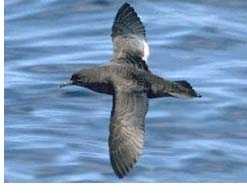Kosuke Tanaka (Laboratory of Organic Geochemistry, Tokyo University of Agriculture and Technology, Japan) and colleagues, publishing in the Marine Pollution Bulletin, have looked at plastic-derived chemicals in tissues of Short-tailed Shearwaters Puffinus tenuirostris.
The paper's abstract follows
"We analyzed polybrominated diphenyl ethers (PBDEs) in abdominal adipose of oceanic seabirds (short-tailed shearwaters, Puffinus tenuirostris) collected in northern North Pacific Ocean. In 3 of 12 birds, we detected higher-brominated congeners (viz., BDE209 and BDE183), which are not present in the natural prey (pelagic fish) of the birds. The same compounds were present in plastic found in the stomachs of the 3 birds. These data suggested the transfer of plastic-derived chemicals from ingested plastics to the tissues of marine-based organisms."

Short-tailed Shearwater. Photograph by Mark Carey
Reference:
Tanaka, K., Takada, H., Yamashita, R., Mizukawa, K., Fukuwaka, M. & Watanuki, Y. 2012. Accumulation of plastic-derived chemicals in tissues of seabirds ingesting marine plastics. Marine Pollution Bulletin doi.org/10.1016/j.marpolbul.2012.12.010.
With thanks to John Kieser for information.
John Cooper, ACAP Information Officer, 12 January 2013

 English
English  Français
Français  Español
Español